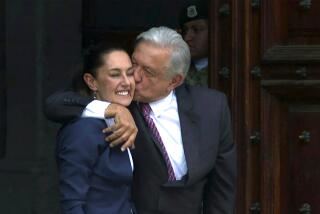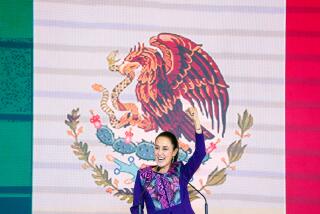Fox Lays Out Plan to Overhaul Justice System in Mexico
President-elect Vicente Fox on Tuesday sketched his vision for a new Mexico that will arise after 71 years of virtual one-party rule, and made it clear just how thoroughly he intends to change this nation.
In a two-hour session with foreign reporters, Fox explained his plans for revamping the justice system to attack corruption and organized crime. And he said he will create a new auditing mechanism to make officials of his government accountable.
“We will put the whole federal government under a total-quality program,” Fox said, invoking a business world term drawn from his 15-year career with Coca-Cola’s Mexico subsidiary.
While Fox was looking to the future after his landslide presidential victory Sunday, leaders of the defeated Institutional Revolutionary Party, or PRI, were wrestling in a turbulent closed-door meeting with how the faction can survive its historic loss.
The PRI’s president, former Yucatan state Gov. Dulce Maria Sauri, offered to resign, although later Tuesday night she said she had been persuaded to stay on for now. Meanwhile, Gov. Roberto Madrazo of Tabasco complained publicly that party leaders were trying to rush through decisions without even a semblance of internal democracy. And even President Ernesto Zedillo, hailed by world leaders for overseeing the clean ballot, was criticized by fellow PRI stalwarts.
Fox, meanwhile, stressed that he will seek consensus and pacts with diverse political players, recognizing that his center-right National Action Party, or PAN, will govern from a minority position.
Although the party made huge gains in congressional races and will be the largest bloc in both the Senate and Chamber of Deputies for the first time, the PAN is still short of a majority in either house and will need to cultivate allies.
“I am a practical person,” Fox said, discussing his style of rule. “I always prefer to reach a consensus rather than impose my views. My experience is that by building a consensus, you get where you want to go much faster.”
Fox was careful to add that he will not seek revenge against outgoing PRI government officials or make abrupt changes. For example, he said he will continue the tradition of appointing the defense minister from within the armed forces rather than naming a civilian. “We don’t have to break a thread that has brought stability to the country,” he said.
But he repeatedly emphasized his determination to make the federal bureaucracy professional and honest--and thus attack the endemic inefficiency and corruption that have outraged ordinary Mexicans and no doubt contributed to the PRI’s defeat.
Fox said he will take policing out of the hands of the powerful, politicized Interior Ministry--once run by Francisco Labastida, his PRI opponent in the just-ended campaign--and create a new Ministry of Justice and Security focused on effective policing.
He said he will abolish the national attorney general’s office, which combines the investigation and prosecution of federal crimes, including drug trafficking. Those functions will be separated between the new justice ministry and a prosecuting arm within the judicial branch, Fox said.
Rising crime rates in many parts of Mexico and perceived impunity for criminals because of corruption and inefficiency ranked near the top of public concerns in preelection opinion polls.
Fox also said he wants Congress to be fully responsible for auditing the executive branch of government, through a new agency similar to the U.S. General Accounting Office. That would go a long way toward constraining the powers of the presidency, which, under the PRI, has been almost beyond scrutiny.
Providing more details about the five-month period before Zedillo hands over the office Dec. 1, Fox said his transition team is working with five headhunting firms to help identify candidates for Cabinet positions. He said he will name his Cabinet by the end of August so members can spend the subsequent three months working with their counterparts in the outgoing government.
“These two months, July and August, will determine the success of my sexenio [six-year term],” Fox said. “In my experience, if you have a good team, you can get to the moon. . . . I work in a very decentralized way, I delegate to my team. So if my team is strong, I can do well.”
Fox also said he wants the 2001 budget to be drafted and submitted to the incoming Congress on Sept. 1, which would be a huge change. In the past, the executive submitted the budget on Dec. 1 and the spending and tax plans were adopted by Dec. 31, with little chance for serious analysis.
Asked about the future of Zedillo’s party, Fox said, “This is a wonderful opportunity for the PRI to rebuild itself.”
Meanwhile, leaders of the vanquished PRI turned to painful soul-searching about the party’s direction and the likelihood of a housecleaning in the highest ranks.
As work crews outside PRI headquarters tore down giant campaign banners bearing the visage of Labastida, party chiefs met privately to consider new leaders. Sauri, the party leader, said Tuesday night that she would stay on while a “committee of reflection” debated the party’s future.
“There’s a mood of tension” as the party wrestles with picking a new leader, a senior PRI official who requested anonymity said Tuesday. In the past, the president always dictated the party leader.
“This means the political forces are trying to reach an agreement, but we have no culture of this,” the senior official said. “We always had instructions from above.”
Madrazo, the Tabasco state governor, who lost the party presidential primary to Labastida in November, had refused to attend the PRI National Political Council meeting scheduled to be held Tuesday night. The gathering of about 360 representatives from the party’s vast network of interest groups, from youth to peasants, was later canceled.
In a letter to the PRI, Madrazo said he couldn’t endorse with his presence a process “that does not correspond to the gravity of our circumstances.” He said the PRI could not solve its problems “with the exhausted recipes and instruments of yesterday.”
Instead, Madrazo suggested that the PRI form a “national commission for the transition” to debate openly what direction the PRI should take.
Among names circulating as possible PRI leaders were Madrazo and Manuel Bartlett, former governor of the central state of Puebla.
Also mentioned in news reports as contenders were Jesus Murillo Karam, a former governor of Hidalgo in central Mexico, and Cesar Camacho, ex-governor of the state of Mexico, which encircles Mexico City.
Zedillo reportedly was supporting Murillo Karam, but some party officials were quoted as objecting to any attempt by Zedillo to impose any party leader--especially because in their minds he had opened the door to the party’s defeat with electoral reforms.
The party’s 40-member executive committee met for a second day of marathon talks Tuesday that served only to highlight personal rivalries.
On a giant lighted message board atop the headquarters, a once-hopeful campaign slogan now seemed plaintive: “For a new millennium,” it said, “a new PRI.”
*
Times researcher Jose Diaz Briseno contributed to this report.
More to Read
Sign up for Essential California
The most important California stories and recommendations in your inbox every morning.
You may occasionally receive promotional content from the Los Angeles Times.






